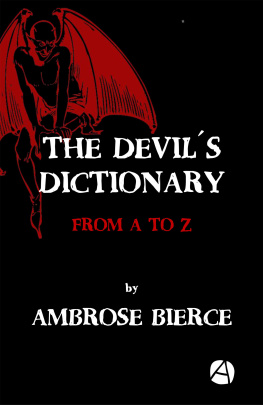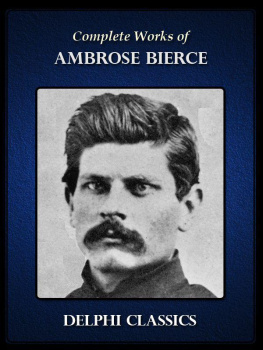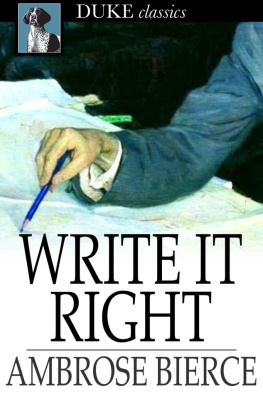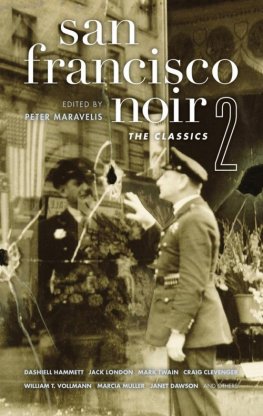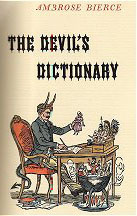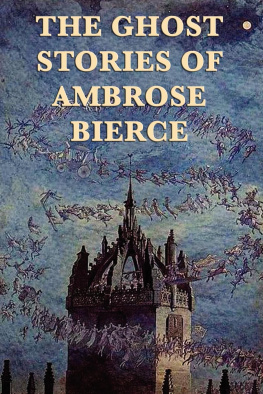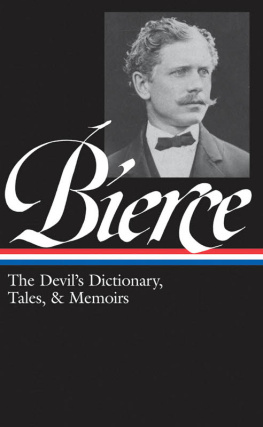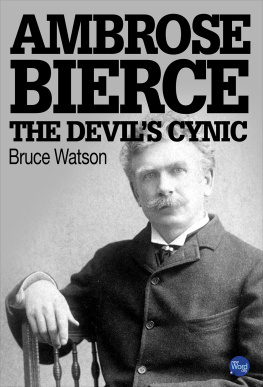Ambrose Bierce - The Moonlit Road
Here you can read online Ambrose Bierce - The Moonlit Road full text of the book (entire story) in english for free. Download pdf and epub, get meaning, cover and reviews about this ebook. genre: Prose. Description of the work, (preface) as well as reviews are available. Best literature library LitArk.com created for fans of good reading and offers a wide selection of genres:
Romance novel
Science fiction
Adventure
Detective
Science
History
Home and family
Prose
Art
Politics
Computer
Non-fiction
Religion
Business
Children
Humor
Choose a favorite category and find really read worthwhile books. Enjoy immersion in the world of imagination, feel the emotions of the characters or learn something new for yourself, make an fascinating discovery.

- Book:The Moonlit Road
- Author:
- Genre:
- Rating:5 / 5
- Favourites:Add to favourites
- Your mark:
- 100
- 1
- 2
- 3
- 4
- 5
The Moonlit Road: summary, description and annotation
We offer to read an annotation, description, summary or preface (depends on what the author of the book "The Moonlit Road" wrote himself). If you haven't found the necessary information about the book — write in the comments, we will try to find it.
The Moonlit Road — read online for free the complete book (whole text) full work
Below is the text of the book, divided by pages. System saving the place of the last page read, allows you to conveniently read the book "The Moonlit Road" online for free, without having to search again every time where you left off. Put a bookmark, and you can go to the page where you finished reading at any time.
Font size:
Interval:
Bookmark:
The Moonlit Road
by Ambrose Bierce
I
STATEMENT OF JOEL HETMAN, JR.
I AM the most unfortunate of men. Rich, respected, fairly well educated and of sound healthwith many other advantages usually valued by those having them and coveted by those who have them not I sometimes think that I should be less unhappy if they had been denied me, for then the contrast between my outer and my inner life would not be continually demanding a painful attention. In the stress of privation and the need of effort I might sometimes forget the somber secret ever baffling the conjecture that it compels.
I am the only child of Joel and Julia Hetman. The one was a well-to-do country gentleman, the other a beautiful and accomplished woman to whom he was passionately attached with what I now know to have been a jealous and exacting devotion. The family home was a few miles from Nashville, Tennessee, a large, irregularly built dwelling of no particular order of architecture, a little way off the road, in a park of trees and shrubbery.
At the time of which I write I was nineteen years old, a student at Yale. One day I received a telegram from my father of such urgency that in compliance with its unexplained demand I left at once for home. At the railway station in Nashville a distant relative awaited me to apprise me of the reason for my recall: my mother had been barbarously murderedwhy and by whom none could conjecture, but the circumstances were these:
My father had gone to Nashville, intending to return the next afternoon. Something prevented his accomplishing the business in hand, so he returned on the same night, arriving just before the dawn. In his testimony before the coroner he explained that having no latchkey and not caring to disturb the sleeping servants, he had, with no clearly defined intention, gone round to the rear of the house. As he turned an angle of the building, he heard a sound as of a door gently closed, and saw in the darkness, indistinctly, the figure of a man, which instantly disappeared among the trees of the lawn. A hasty pursuit and brief search of the grounds in the belief that the trespasser was some one secretly visiting a servant proving fruitless, he entered at the unlocked door and mounted the stairs to my mother's chamber. Its door was open, and stepping into black darkness he fell headlong over some heavy object on the floor. I may spare myself the details; it was my poor mother, dead of strangulation by human hands!
Nothing had been taken from the house, the servants had heard no sound, and excepting those terrible finger-marks upon the dead woman's throatdear God! that I might forget them!no trace of the assassin was ever found.
I gave up my studies and remained with my father, who, naturally, was greatly changed. Always of a sedate, taciturn disposition, he now fell into so deep a dejection that nothing could hold his attention, yet anythinga footfall, the sudden closing of a dooraroused in him a fitful interest; one might have called it an apprehension. At any small surprise of the senses he would start visibly and sometimes turn pale, then relapse into a melancholy apathy deeper than before. I suppose he was what is called a "nervous wreck." As to me, I was younger then than nowthere is much in that. Youth is Gilead, in which is balm for every wound. Ah, that I might again dwell in that enchanted land! Unacquainted with grief, I knew not how to appraise my bereavement; I could not rightly estimate the strength of the stroke.
One night, a few months after the dreadful event, my father and I walked home from the city. The full moon was about three hours above the eastern horizon; the entire countryside had the solemn stillness of a summer night; our footfalls and the ceaseless song of the katydids were the only sound aloof. Black shadows of bordering trees lay athwart the road, which, in the short reaches between, gleamed a ghostly white. As we approached the gate to our dwelling, whose front was in shadow, and in which no light shone, my father suddenly stopped and clutched my arm, saying, hardly above his breath:
"God! God! what is that?"
"I hear nothing," I replied.
"But see see!" he said, pointing along the road, directly ahead.
I said: "Nothing is there. Come, father, let us go inyou are ill."
He had released my arm and was standing rigid and motionless in the center of the illuminated roadway, staring like one bereft of sense. His face in the moonlight showed a pallor and fixity inexpressibly distressing. I pulled gently at his sleeve, but he had forgotten my existence. Presently he began to retire backward, step by step, never for an instant removing his eyes from what he saw, or thought he saw. I turned half round to follow, but stood irresolute. I do not recall any feeling of fear, unless a sudden chill was its physical manifestation. It seemed as if an icy wind had touched my face and enfolded my body from head to foot; I could feel the stir of it in my hair.
At that moment my attention was drawn to a light that suddenly streamed from an upper window of the house: one of the servants, awakened by what mysterious premonition of evil who can say, and in obedience to an impulse that she was never able to name, had lit a lamp. When I turned to look for my father he was gone, and in all the years that have passed no whisper of his fate has come across the borderland of conjecture from the realm of the unknown.
II
STATEMENT OF CASPAR GRATTAN
To-day I am said to live; to-morrow, here in this room, will lie a senseless shape of clay that all too long was I. If anyone lift the cloth from the face of that unpleasant thing it will be in gratification of a mere morbid curiosity. Some, doubtless, will go further and inquire, "Who was he?" In this writing I supply the only answer that I am able to makeCaspar Grattan. Surely, that should be enough. The name has served my small need for more than twenty years of a life of unknown length. True, I gave it to myself, but lacking another I had the right. In this world one must have a name; it prevents confusion, even when it does not establish identity. Some, though, are known by numbers, which also seem inadequate distinctions.
One day, for illustration, I was passing along a street of a city, far from here, when I met two men in uniform, one of whom, half pausing and looking curiously into my face, said to his companion, "That man looks like 767." Something in the number seemed familiar and horrible. Moved by an uncontrollable impulse, I sprang into a side street and ran until I fell exhausted in a country lane.
I have never forgotten that number, and always it comes to memory attended by gibbering obscenity, peals of joyless laughter, the clang of iron doors. So I say a name, even if self-bestowed, is better than a number. In the register of the potter's field I shall soon have both. What wealth!
Of him who shall find this paper I must beg a little consideration. It is not the history of my life; the knowledge to write that is denied me. This is only a record of broken and apparently unrelated memories, some of them as distinct and sequent as brilliant beads upon a thread, others remote and strange, having the character of crimson dreams with interspaces blank and blackwitch-fires glowing still and red in a great desolation.
Standing upon the shore of eternity, I turn for a last look landward over the course by which I came. There are twenty years of footprints fairly distinct, the impressions of bleeding feet. They lead through poverty and pain, devious and unsure, as of one staggering beneath a burden
Remote, unfriended, melancholy, slow.
Ah, the poet's prophecy of Mehow admirable, how dreadfully admirable!
Font size:
Interval:
Bookmark:
Similar books «The Moonlit Road»
Look at similar books to The Moonlit Road. We have selected literature similar in name and meaning in the hope of providing readers with more options to find new, interesting, not yet read works.
Discussion, reviews of the book The Moonlit Road and just readers' own opinions. Leave your comments, write what you think about the work, its meaning or the main characters. Specify what exactly you liked and what you didn't like, and why you think so.

